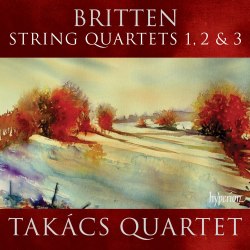| 
Support
us financially by purchasing this disc from |
|
|
|
|
|
Benjamin BRITTEN (1913-1976)
String Quartet No. 1 in D, Op. 25 [24:11]
String Quartet No. 2 in C, Op. 36 [26:53]
String Quartet No. 3, Op. 94 [24:49]
Takács Quartet
rec. Concert Hall, Wyastone Estate, Monmouth, 12-15 February 2013
HYPERION CDA68004 [75:55]
Since they found a home with Hyperion the Takács Quartet have
wasted no time in shoring up their already enviable reputation; their
recording of the Schubert Quintet was loaded with accolades on all
sides.
This well-timed release of Britten’s numbered quartets, recorded
and released in the centenary year, will win them even more praise.
There is a wonderful intimacy to both their playing and the recorded
sound, but they’re not beyond making an unlovely sound when
they need to. You hear that right at the opening of the First Quartet:
the diatonic opening to the first movement sounds mysterious, but
also oddly disconnected, as though it consisted of two strains of
music that were refusing to listen to one another. The players then
set about the main allegro section with arresting vigour and vitality.
In fact, it was here, especially, that their playing reminded me of
the muscularity and energy that they brought to their outstanding
Beethoven interpretations. Their playing also reminds you that this
was young man’s music, written to a commission when the 20-year
old composer was in the USA taking refuge from the Second World War.
The Allegretto second movement is played with a touch of tongue-in-cheek
humour, the players seeming to pose and answer questions from one
another like a communal chat. There is then a hushed warmth to the
opening of the slow movement, with an element of danger creeping into
the repeated notes of the central section; but overall it’s
an uncanny sense of communion that characterises the movement, whereas
it’s skittish invention that characterises the finale.
The transparency of the playing lays open the harmonic inventiveness
of the Second Quartet’s first movement. Again, though, there
is an architectural vigour in the way they treat the themes, be it
the spidery harmonics or the warm, chorale-like chords. The work builds,
through the scherzo, to the climax of the third movement Chacony,
which is perhaps the climax of the whole disc. The Takács unmistakeably
grasp the scale of Britten’s structural genius here, and it
is as if their playing takes on a greater scale to match it. They
work their way through the kaleidoscopic range of variations with
consummate skill and a great ear for detail, bringing out the vast
range of differences over the essential unifying factor of the theme.
There is richness, depth, eeriness and beauty. The cadenzas that separate
each group of variations are played with incredible artistry, and
the repeated C major chords that end the movement seem to radiate
both affirmation and authority.
The Third Quartet comes from 1975, towards the very end of the composer’s
life, after Death in Venice and Britten’s heart operation.
The sound world is perceptibly different from the very start. The
music seems to grope its way uncertainly into being, and Geraldine
Walther’s viola sounds particularly fantastic here, providing
what little anchoring the piece has at this point. When the more contrapuntal
elements do emerge there is still an element of insecurity hanging
over the music and the first movement comes to an end in predominant
mood of uncertainty. The two scherzo movements are played with much
more assertiveness, but that uncertain sense of searching permeates
the central slow movement, too. Again, the Takács players seem
to recapture that sense of disconnectedness that characterised the
very opening of the disc, and for a few moments this also filters
into the finale, permeated with its references to Death in Venice.
When the main theme kicks in around the three-minute mark, though,
the music seems gently to take on an uncanny combination of resignation
and purposefulness. As the movement progresses this seems to flower
into something profound, combining harmonic invention and melodic
security with an unavoidable sense of finality. It’s difficult
to shake off the fact that Britten was dying as he wrote this music,
and he must have known that his illness would finally finish him -
Colin Matthews acted as his amanuensis for much of the composition
process, and Britten struggled even to sit through a private performance
from the Amadeus Quartet in 1976. This sense of passing is underlined
even further, perhaps unconsciously, by the way the final bar seems
almost to break off in mid-sentence.
The all-important sense of ambiguity, present to a greater or lesser
degree in all of this music - though perhaps especially in
the Third’s finale - is conveyed with the utmost delicacy and
discretion by the players, putting their interpretation towards the
top of the league table for these works.
Anyone wanting to engage seriously with Britten’s quartets will
need to do business with the Belcea Quartet, who also provide some
of the youthful divertimenti, and the Sorrel Quartet on Chandos who
provide still more in their two disc edition, but the Takács’
contribution to the Britten centenary is able to look those performers
in the face.
Simon Thompson
Britten discography & review index: String
quartets
 |
 |
|














